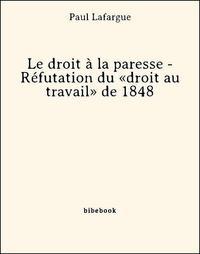Français language
" Une étrange folie possède les classes ouvrières des nations ou règne la civilisation capitaliste. Cette folie traîne à sa suite des misères individuelles et sociales qui, depuis deux siècles, torturent la triste humanité. Cette folie est l'amour du travail, la passion moribonde du travail, poussée jusqu'à l'épuisement des forces vitales de l'individu et de sa progéniture ". Ainsi commence le fameux pamphlet de Paul Lafargue (1842-1911), Le Droit à la paresse, initialement publié en 1880. Intellectuel socialiste et militant infatigable de la cause du peuple, il signait là un texte pionnier, premier essai en faveur d'un retournement de civilisation, produit heureux d'une volonté de provocation et d'une intuition géniale. d'un authentique sentiment révolutionnaire et anticipateur.
The Right to be Lazy is an essay by Cuban-born French revolutionary Marxist Paul Lafargue, written from his London exile in 1880. The essay polemicizes heavily against then-contemporary liberal, conservative, Christian and even socialist …
" Une étrange folie possède les classes ouvrières des nations ou règne la civilisation capitaliste. Cette folie traîne à sa suite des misères individuelles et sociales qui, depuis deux siècles, torturent la triste humanité. Cette folie est l'amour du travail, la passion moribonde du travail, poussée jusqu'à l'épuisement des forces vitales de l'individu et de sa progéniture ". Ainsi commence le fameux pamphlet de Paul Lafargue (1842-1911), Le Droit à la paresse, initialement publié en 1880. Intellectuel socialiste et militant infatigable de la cause du peuple, il signait là un texte pionnier, premier essai en faveur d'un retournement de civilisation, produit heureux d'une volonté de provocation et d'une intuition géniale. d'un authentique sentiment révolutionnaire et anticipateur.
The Right to be Lazy is an essay by Cuban-born French revolutionary Marxist Paul Lafargue, written from his London exile in 1880. The essay polemicizes heavily against then-contemporary liberal, conservative, Christian and even socialist ideas of work. Lafargue criticizes these ideas from a Marxist perspective as dogmatic and ultimately false by portraying the degeneration and enslavement of human existence when being subsumed under the primacy of the "right to work", and argues that laziness, combined with human creativity, is an important source of human progress.
He manifests that "When, in our civilized Europe, we would find a trace of the native beauty of man, we must go seek it in the nations where economic prejudices have not yet uprooted the hatred of work … The Greeks in their era of greatness had only contempt for work: their slaves alone were permitted to labor: the free man knew only exercises for the body and mind ... The philosophers of antiquity taught contempt for work, that degradation of the free man, the poets sang of idleness, that gift from the Gods." And so he says "Proletarians, brutalized by the dogma of work, listen to the voice of these philosophers, which has been concealed from you with jealous care: A citizen who gives his labor for money degrades himself to the rank of slaves." (The last sentence paraphrasing Cicero.)
